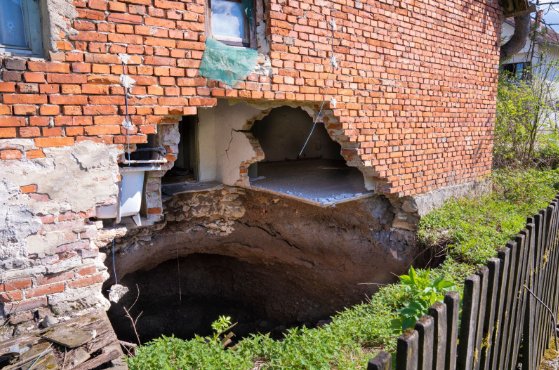Homeowners insurance is a crucial safety net, providing peace of mind against unexpected damages to our homes. However, regarding sinkholes, a standard policy might offer a different protection than you assume. Sinkholes, the silent ground swallowers, are not usually covered, leaving homeowners to wonder about their options for safeguarding their properties against these geological phenomena.
Understanding Sinkholes
A sinkhole forms when water erodes underlying rock, enlarging cracks and cavities until the ground above collapses. These natural occurrences can vary dramatically in size—from a few feet to several acres—and depth, with some plunging over 100 feet. Quick to form and capable of causing severe damage, addressing sinkholes promptly is paramount to prevent catastrophic outcomes for homeowners.
Assessing Sinkhole Risk
Though the likelihood of a sinkhole affecting your property might seem slim, it’s not unheard of. The United States Geological Survey (USGS) lists states like Alabama, Florida, Kentucky, Missouri, Pennsylvania, Tennessee, and Texas as areas with higher occurrences. Understanding your local risk can guide decisions on whether seeking additional coverage is prudent.
Options for Sinkhole Insurance Coverage
Most homeowners’ insurance policies explicitly exclude coverage for earth movements, including sinkholes. However, you can extend your policy through endorsements or riders specifically designed to cover sinkhole damage. These add-ons typically cover the cost of repairs to a home’s foundation and efforts to stabilize the land, alongside possibly extending protection to personal property affected by the event.
Procedure for Filing a Sinkhole Claim
To lodge a sinkhole claim, homeowners must demonstrate that their property has suffered structural damage or is at imminent risk of collapse due to a sinkhole. This requirement underscores the need for a thorough understanding of what your policy covers and the evidence needed to support a claim.
Vehicle Coverage for Sinkhole Damage
Sinkhole damage falls under comprehensive coverage for vehicles. This part of your auto insurance pays for repairs or replacement of a vehicle damaged by incidents other than collisions, including sinkholes, offering an essential layer of protection for your automotive assets.
Sinkhole Insurance Availability and Cost
The availability and cost of sinkhole insurance can vary widely, influenced by geographic location and the specifics of the property in question. In states like Alabama, insurers may require a property inspection before offering sinkhole coverage, determining eligibility based on the perceived risk. These policies often come with their deductibles, separate from the standard policy deductible, which can range from 1% to 10% of the dwelling’s coverage limit—a significant consideration for those evaluating the cost versus benefit of such coverage
Summary
Understanding the limitations of standard homeowners insurance regarding sinkholes is crucial for those living in prone areas. Assessing your risk and exploring additional coverage options can provide a financial safeguard against this unpredictable natural disaster. While additional premiums and deductibles may seem daunting, the cost of being unprepared can be far greater.
In navigating these waters, homeowners must weigh their vulnerability to sinkholes against the potential financial impact, armed with the knowledge that while sinkholes are rare, their effects can be devastatingly sudden and expensive to mitigate. Consulting with an insurance professional can help tailor your policy to include the protection you need, ensuring that your home—and peace of mind—remains secure in the face of nature’s unpredictability.
FAQs
Can I get sinkhole coverage for a rental property?
Yes, sinkhole coverage is available for rental properties, but like homeowner policies, it typically requires an endorsement or a specific rider. Landlords should consult their insurance provider to ensure their rental investments are protected against sinkhole damage, particularly if the property is located in a high-risk area.
Are there preventive measures I can take to reduce sinkhole risks?
While preventing natural geological processes is not possible, ensuring proper water management around your property can help. Avoid excessive water accumulation by maintaining good drainage systems and avoiding activities that could lead to underground water flow disruptions, such as excessive drilling or mining if applicable.
How long does it take to settle a sinkhole claim?
The time to settle a sinkhole claim can vary significantly depending on the complexity of the case, the extent of damage, and the thoroughness of the assessments required. It’s not uncommon for sinkhole claims to take several months to resolve due to the need for detailed geological assessments and the often extensive repairs involved.
Get the right coverage for your home with tutenagency
New tutenagency customers?
Quote homeowners insurance online or call (334) 502-5111 to insure your home.
Legal Disclaimer: ADVERTISING MATERIAL ONLY. Do not rely on this site or this article for legal or financial advice. The information provided on 210agency.com is strictly for educational purposes and to provide you with general educational information. Since state laws and financial regulations are subject to change, please schedule an appointment with an attorney or qualified financial advisor in your area to further discuss your personal situation. This public information is neither intended to, nor will it, create an attorney-client or financial representative relationship.

